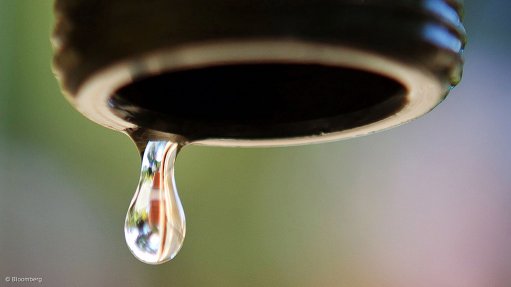
Photo by: Bloomberg
Civil rights organisation AfriForum averred on Wednesday to continue its newly launched national water project despite resistance and the possibility of a legal challenge from government.
The organisation this week launched the ‘Blue and Green Drop Branch Project’ to independently test the quality of potable, or Blue Drop, and treated sewage, or Green Drop, water across 125 municipalities.
The Department of Water Affairs (DWA) slammed the credibility of AfriForum’s initiative, the results of which would be publicly released on March 17, accusing the organisation of attempting to mislead the public.
“While the organisation reserves the right, in terms of the constitution, to engage in its political programmes and public engagement initiatives, the department wishes to warn the organisation that such actions carry the possibility of a legal challenge and, even more dangerous, [the] potential to mislead the public about the true nature of water services regulation and performance monitoring,” DWA spokesperson Mava Scott said.
The department commented that, “at face value”, AfriForum’s project appeared “genuine”.
“But a careful examination of the facts reveals the opposite and, at worst, the risk carried by such opportunism,” she said.
"We are disappointed and somewhat baffled by the response from DWA. One would think that the department would welcome assistance with the management and conservation of water. If we should identify a problem, the DWA will be able to step in and solve it immediately,” AfriForum head of environmental affairs Julius Kleynhans said.
The DWA said the testing to be undertaken by AfriForum focused only on water quality analysis – a portion of the DWA’s original Blue and Green Drop yearly audits, which covered the “entire value chain” including reticulation, pumping, treatment and discharge, while recording trends.
The department also criticised the analysis of only 125 wards, as the DWA focused on the entire nation, with previous assessments covering 821 wastewater collector systems and 931 water supply systems.
The DWA also questioned AfriForum’s approach in accessing the premises without the legislated permission from Water Affairs Minister Edna Molewa.
“The Water Services Act requires that such access be granted by the Minister or other such authority in the designated area. The law does not allow ordinary citizens access to water treatment facilities unless … [permission is granted] in writing,” the DWA warned.
“AfriForum will continue with its project; threats from the DWA will not deter us. But these threats do raise serious concerns about the true state of water management in South Africa,” Kleynhans said, adding that the nation faced a “huge crisis” on the back of water resource mismanagement.
“We need political will, efficient financial and infrastructure management, and the cooperation of communities in our municipalities to conserve this critical resource sustainably,” he added.
AfriForum would have the water samples tested by independent South African National Accreditation System-accredited laboratories and local authorities and the media would be invited to accompany the test teams to ensure the validity of the tests.